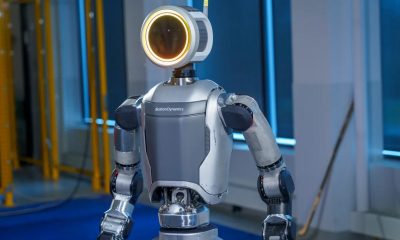Entertainment
‘Shang-Chi and the Legend of the Ten Rings’: Movie Review

My favorite moment in Shang-Chi and the Legend of the Ten Rings is the first time Shang takes his shirt off. Not because he’s unreasonably ripped, although that is objectively true; it’s his best friend Katy’s reaction to finding out that Shang (Simu Liu), her cautious, mild-mannered buddy who she recently discovered is the son of an immortal supervillain, is unreasonably ripped.
Katy (Awkwafina) stares up at his torso, half in awe and half in complete confusion, as if she’s just put it together that her BFF has lied to her about everything. Shang spots Katy in a crowd, meets her judgemental gaze and responds with an exasperated shrug. So I’ve been hiding some stuff, the shrug conveys, do you seriously want me to apologize for looking this good?
That brief moment is a distillation of the elements that make Shang-Chi great— it pokes fun at the tropes of the Marvel universe by exposing how weird it must be to live in that world; it’s funny enough to prioritize Katy’s realization that Shang is hot over her reaction to finding out he half-belongs in the world of superheroes; and it relies on the charm and chemistry of its actors as opposed to flashy effects. It’s a Marvel movie that doesn’t feel like a Marvel movie, with a fresh, snappy tone that has a lot in common with 2015’s Ant-Man, which also felt like a departure from the franchise formula at the time.
At its core, Shang-Chi and the Legend of the Ten Rings is a story about a broken family. It just so happens that each member of this family is exclusively a living weapon with sick martial arts skills. Even as Shang-Chi indulges in grand, excellently choreographed fight scenes (you’ll never look at scaffolding the same way again), the central conflict between Shang, his father Wenwu (Tony Leung), and his sister Xialing (Meng’er Zhang) is important enough to make the stakes feel character driven and personal. The intimacy of that conflict also sets Shang-Chi apart from the rest of Marvel without making the movie feel smaller or less important. On the contrary, Shang-Chi brings something very important to the MCU.
Simu Liu is the guy audiences will cheer for when he shows up in a post credit scene because hell yeah, Shang-Chi is in the house.
Simu Liu is flawless in the role of Shang-Chi. Every choice he makes on screen builds Shang’s character from a hero most people hadn’t heard of to an invaluable personality the MCU can bank on for years to come. Liu is so good at defining Shang’s exterior charm and inner turmoil that his casting has the miraculous quality of Robert Downey Jr.’s industry-changing role in the first Iron Man or Chris Evans’ Captain America. Simu Liu is the guy audiences will cheer for when he shows up in a post credit scene because hell yeah, Shang-Chi is in the house.
Though the bulk of the movie is obviously on Liu’s shoulders, the rest of the cast completely nail their roles. Tony Leung in particular is magnificent as Shang-Chi’s father Wenwu, the leader of the Ten Rings who is also the movie’s primary antagonist. I have a theory that Marvel villains are only great when they’re related to the hero, and Wenwu is another data point in favor of that hypothesis. Wenwu is a bad father who still loves his kids, a potentially good man who can’t escape the pull of villainy, and his relationship with Shang-Chi is a frightening, abusive analogue of the “hurt people hurt people” variety — it’s a lot for one character and Leung makes the role look easy.
With an instantly lovable hero and one of Marvel’s best villains, Shang-Chi and the Legend of the Ten Rings is a genuinely great movie — for as long as the characters, hand-to-hand combat scenes, and family conflict remain the focus of the film. That’s about 92% of the time. The other 8% is, quite frankly, smashy CGI nonsense that feels out of sync with the rest of the movie and smacks of studio executives mindlessly stuffing the third act with shiny junk. So, you know, it’s a Marvel movie ending. It’s just that this time, that annoying Marvel ending is tacked on to something they really should have trusted enough to earn a departure from that trope.
It’s a big deal that Shang-Chi is the MCU’s first Asian superhero. It’s also a big deal that it took 13 years for them to cast one. Shang-Chi, both the movie and the character, should not have to be a load-bearing pillar when it comes to determining future Asian representation in the MCU and beyond, but the reality is that this movie’s reception will be a bellwether for the perceived box office appeal of Asian people as a monolith. What matters right now is that Destin Daniel Kretten directed a fascinatingly unique and more importantly good movie with an outstanding cast and a leading man who deserves every ounce of hype.
Shang-Chi and the Legend of the Ten Rings is an accomplishment as a standalone movie; if it were not an MCU film it would still be fantastic. As a glimpse of a more diverse, less token-y future of the MCU, it’s even better. Especially in the post-credit scene. If there’s more of that coming up, everybody wins.
Shang-Chi and the Legend of the Ten Rings hits theaters Sept. 3.
Related Video: The MCU phases explained in 5 minutes
-

 Business7 days ago
Business7 days agoThis camera trades pictures for AI poetry
-

 Business6 days ago
Business6 days agoTikTok Shop expands its secondhand luxury fashion offering to the UK
-

 Business7 days ago
Business7 days agoBoston Dynamics unveils a new robot, controversy over MKBHD, and layoffs at Tesla
-

 Business5 days ago
Business5 days agoMood.camera is an iOS app that feels like using a retro analog camera
-

 Business5 days ago
Business5 days agoUnitedHealth says Change hackers stole health data on ‘substantial proportion of people in America’
-

 Business4 days ago
Business4 days agoTesla’s new growth plan is centered around mysterious cheaper models
-

 Business3 days ago
Business3 days agoXaira, an AI drug discovery startup, launches with a massive $1B, says it’s ‘ready’ to start developing drugs
-

 Entertainment5 days ago
Entertainment5 days agoFurious Watcher fans are blasting it as ‘greedy’ over paid subscription service






















